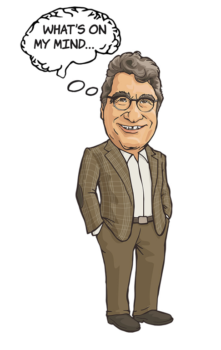 American research universities are hubs of knowledge and new ideas, with innovation largely fueled by our faculty. From our most seasoned experts at the tops of their fields to the early- and mid-career members driving discovery through new research, Vanderbilt not only recruits current and future stars; we develop them right here on our campus—providing the resources they need to enhance their curriculums, to grow as people and to share their findings with the world.
American research universities are hubs of knowledge and new ideas, with innovation largely fueled by our faculty. From our most seasoned experts at the tops of their fields to the early- and mid-career members driving discovery through new research, Vanderbilt not only recruits current and future stars; we develop them right here on our campus—providing the resources they need to enhance their curriculums, to grow as people and to share their findings with the world.
Vanderbilt faculty and their work consistently garner widespread attention, from The Economist featuring Assistant Professor of Medicine, Health and Society Lauren Gaydosh’s research on depression in America, to a recent episode of WNYC’s Radiolab including an interview with Professor of Electrical Engineering Bharat Bhuva about the impact of solar rays on electronics, to Professor of History Jane Landers earning national recognition in The New York Times about her efforts to earn a UNESCO “Site of Memory” designation for Nashville’s Fort Negley. This work and the work of many other faculty are propelling weighty and important conversations on an almost daily basis in academia and far beyond.
Provost and Vice Chancellor for Academic Affairs Susan R. Wente has woven in faculty development throughout the Academic Strategic Plan and we are always considering new ways to create opportunity for all of our faculty members. From our Public Voices Fellowship—a media training program designed to expand the audience for Vanderbilt scholars—to our Chancellor’s Faculty Fellows program, which now has its fifth cohort of fellows, Vanderbilt is dedicated to providing the opportunities and support that our faculty need to obtain grand objectives and the academic excellence that comes with them.
To say that past Faculty Fellows are making great strides is only the smallest hint towards a much bigger picture—one that’s packed with accolades and life-changing discoveries. From the inaugural 2015 cohort alone, faculty achievements have run the gamut from Associate Professor of Physics and Astronomy Kelly Holley-Bockelmann, co-director of the Fisk-Vanderbilt Master’s-to-Ph.D. Bridge Program, who led a first-of-its-kind collaborative team of faculty and student researchers as part of the Sloan Digital Sky Survey funded by the Sloane Foundation; to the findings of Muktar Aliyu, associate director for research and associate professor of health policy and medicine, whose 2017 grant from the NIH has enabled him to explore the treatment and prevention of kidney disease in genetically at-risk HIV-infected adults.
I could go on and on regarding each and every cohort; we all know there is no shortage of innovation at Vanderbilt. But it is increasingly important that the discoveries we make—and the undertones of optimism, solutions and advancement that come with them—have the widest possible platform.
In January, we announced the first cohort for the Public Voices Fellowship, which is designed to amplify the reach of our scholarship and overtly position Vanderbilt faculty as leading, authoritative experts. This summer and into the fall, the three fellows—Hiba Baroud, Jeffrey Bennett and Suzana Herculano-Houzel—will work closely with our Division of Communications to elevate their public profiles and expand understanding of their research through media appearances, social media promotion and personalized narratives such as op-ed pieces and TED talks. We will announce the second cohort of fellows this July.
I am grateful to our Vice Chancellor for Communications Steve Ertel and his team for applying their dedication and expertise to this program, which I believe to be especially vital in our present moment. With the onslaught of news that we experience on an hourly basis—stemming from countless, and often contradictory, sources—reputable scholarship fills a critical void, especially when it is directly tied to a proven and passionate expert.
The Public Voices initiative is positioned to drive change on many levels: bolstering visibility of individual faculty members, amplifying the prestige of Vanderbilt’s programs and reminding the world around us that solid, meaningful information still exists.
As I have said before, the faculty members at Vanderbilt are optimists. Not only that, but they are optimists who are never satisfied; they are actively and constantly seeking improvements and enhancements. Much like myself, they see higher education as America’s greatest hope for curing, for discovery, for understanding.
This is something that our community, and our country, needs to hear. We must not only support the faculty across great research institutions; we must champion them—as individuals, and as symbols of our mission—at every possible turn: whether they are in the classroom, immersed in research or under a very deserving spotlight.